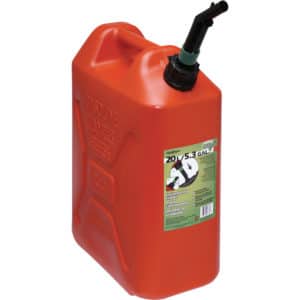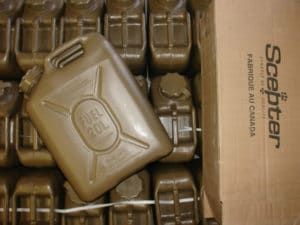
A Scepter gas can lawsuit attorney can help individuals who have been injured after the product exploded without warning. Portable gas cans are used for a variety of purposes, and many Americans keep such containers in their home’s garage or toolshed. Over the years, government regulations and industry standards have improved gasoline safety, however, the risk of a gas can explosion still remains. Affected individuals and their families may be eligible to seek compensation for their injuries with the help of a product liability attorney.
For more information, contact Attorney Group today. Our consultations are free, confidential and without any obligation on your part. We can help answer your questions, and if you choose to pursue a claim we can connect you with an affiliated Scepter gas can lawsuit attorney who can assist you throughout the legal process.
Have You Seen a Scepter Gas Can Lawsuit Commercial?
You may have seen a Scepter gas can lawsuit commercial on television and wondered whether you or a loved one have been affected by a Scepter gas can explosion and, if so, whether you are eligible to pursue a claim against the manufacturer or others. The purpose of this article is to provide you with additional information so that you have a better understanding of your options.
What is a Scepter Gas Can?
Scepter gas cans are portable fuel containers manufactured by Scepter Canada, Inc. As the first manufacturer of Jerry Cans in North America, Scepter claims to provide safe, reliable transportation and storage of fuels for the consumer market.
What is a Gas Can Flame Arrester?
Flame arresters are small mesh screens that fit inside a gas can’s spout. Flame arresters work to filter or screen a spark or flame while preventing any outside vapors from reentering the can and causing a “flashback” explosion. Lawsuits have argued that had some consumer gas cans been equipped with flame arresters, the plastic cans would not have exploded and caused a number of gas can explosion injuries.
Although Scepter claims to produce environmentally-friendly fuel containers that meet or exceed EPA/CARB compliant standards with their line of ECO Fuel Containers, their gas cans reportedly are not equipped with flame arresters. Gas cans that are not equipped with flame arresters reportedly increase the can’s risk of flashback explosions, potentially leading to serious harm to individuals that use the product.
Based on information provided in injury reports, the federal government’s Consumer Product Safety Commission (CPSC) has issued a statement calling for the consumer gas can industry to begin using flame arrester technology in its portable fuel containers in addition to the standards already in place.
Consumer Gas Can Explosion Lawsuit Claims
As part of an NBC News Investigations report, consumer gas cans present a potential risk of explosion, and many Americans may be unaware. According to the report, scientific tests determined that explosions inside the portable gas cans, known as “flashback” explosions, are possible as gas vapors exiting the can come in contact with a source of ignition, such as a flame, spark or buildup of static electricity. This news is important because millions of Americans own portable gas cans, most of which do not have flame arresters.
After an analysis of incident and injury databases, the CPSC counted almost one dozen reported deaths and 1,200 emergency room visits due to gas can explosions. Flashback explosions occur when vapors outside of the gas can ignite, sucking the vapor trial into the can where gasoline vapors have built up.
A number of gas can lawsuits have been filed over the past two decades claiming that consumers were injured as a result of a gas can explosion. Plaintiffs in several cases claim that, because the gas cans did not contain a flame arrester, gas can manufacturers were negligent.
The largest manufacturer of portable consumer gas cans, Blitz USA, filed for bankruptcy in 2012 and went out of business after a large number of lawsuits were brought against them and retailer Wal-Mart. In a separate NBC News report, Wal-Mart agreed to contribute roughly $25 million to settle lawsuits claiming that the nation’s largest retailer knowingly sold a defective product that could explode and produce tragic and sometimes fatal injuries.
Gas Can Accidents

Gas can explosions are rare events, however, injuries due to gasoline explosions can be disastrous and even deadly. Consumer gas cans are required to carry warnings that explicitly state the possible risks associated with plastic gas cans, including the potential for exploding vapors and flame ignition regardless of the distance between the ignition source and the can.
Injuries that may occur as a result of a gas can explosion include:
- Severe burns
- Amputation
- Infection
- Death
Some individuals who have suffered injuries may be required to have numerous surgeries and skin grafts as a result of gas can explosions. In addition to physical injury, individuals who are burned in gas can explosion may be subject to enormous economic and financial suffering as well as emotional distress.
Has There Been Scepter Gas Can Recall?
Although there has not been Scepter gas can recall, lawsuits claim that the product manufacturers failed to disclose warnings of the known dangers associated with flashback explosions and that individuals suffered damages as a result. Failure to warn of the dangers of a product can be a basis of product liability, regardless of whether the product has been recalled.
Is There Scepter Gas Can Class Action?
There is no Scepter gas can class action pending as of August 2016. Scepter gas can lawsuit attorneys are doubtful that a class action will be certified for individuals who are adversely affected by the product. Instead, if multiple Scepter gas can lawsuits are filed against the product manufacturers alleging injuries and other damages caused by Scepter gas cans and similar products, it is anticipated that these lawsuits will be consolidated for discovery and other pretrial proceedings.
When cases are consolidated in this way in federal court it is called multidistrict litigation (MDL), and on a state level it is known as a state court consolidated proceeding. MDLs are distinct from class actions, and it is generally agreed that consolidating cases instead of proceeding in a class action is a more efficient and effective way of handling claims arising from injuries caused by consumer products.
Have There Been Scepter Gas Can Settlements?
Some cases settle early in the claims process, but it is not expected that there will be early Scepter gas can settlements. In most cases that proceed in an MDL or state court consolidated proceedings, after a certain period of time initial trials, also known as bellwether trials, take place. The purpose of these trials is for the parties to get an idea of the types of evidence and arguments that will made, as well as to see how juries will respond to the evidence and arguments. After a certain number of cases have been tried, the parties are in a better position to determine whether a case can be settled.
It is expected that Scepter gas can settlements will follow this pattern, although the outcome of any case is never guaranteed and past results are not necessarily predictive of future outcomes.

How a Scepter gas can Lawsuit Attorney Can Help
People injured as a result of an explosion using a Scepter gas can through no fault of their own may be eligible to recover money for:
- Medical Expenses
- Lost Wages
- Pain and Suffering
- Scarring and disfigurement
The families of those who have died in Scepter gas can explosions may be eligible to recover money for funeral expenses and the pain that comes with losing a loved one.
For more information, contact Attorney Group. After you contact us, an attorney will follow up to answer questions that you might have. There is no cost or obligation to speak with us, and any information you provide will be kept confidential.
Please note that the law limits the time you have to pursue a claim or file a lawsuit for an injury. If you think you have a case, you should not delay taking action.





